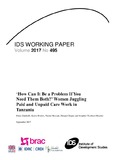| dc.description.abstract | The paper summarizes the findings of a mixed-method research that was carried out in Tanzania as part of the "Balancing Unpaid Care Work and Paid Work: Successes, Challenges and Lessons for Women’s Economic Empowerment Programs and Policies" research project (2015–17). It reflects the voices and experiences of women and their household members participating in Women’s Economic Empowerment (WEE) programs across four sites in the rural districts of Korogwe and Lushoto in Tanga region. Participants in two WEE programs are represented, namely the state-run Women Development Fund (WDF) and Oxfam’s Food Security for Tanzanian Farmers program. The question addressed by the research was: How can Women’s Economic Empowerment (WEE) policies and programs take unpaid care work into account in order to enable Women’s Economic Empowerment to be optimized, shared across families and sustained across generations? This study and its findings clearly indicate that women shoulder the majority of unpaid work and struggle to balance this with paid work responsibilities. While some tasks are shared with other household members, there is no evidence to suggest that women are in a position to redistribute unpaid care work responsibilities to the state, the market or the community. Reasons for this appear to be mainly grounded in gender norms, the lack of public provision of services that are essential for facilitating care as well as paid work, and the low returns on women’s (and men’s) paid work. This study highlights that if no explicit action is undertaken to support a re-balance—whether that is through addressing working conditions, childcare arrangements, social norms, values or otherwise—patterns of unbalance will reproduce and perpetuate themselves, offering women valuable economic opportunities that help to improve living conditions and possibly their position within household or community settings, but never stretching quite far enough to reduce drudgery and the physical and psychosocial stress of juggling too many responsibilities. | en_US |

